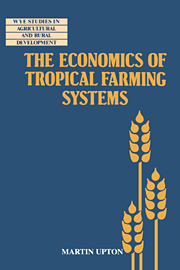Book contents
- Frontmatter
- Contents
- Preface
- Part I Farm household economics
- 1 Farming systems in economic development
- 2 The farmer's environment
- 3 The farmer's production choices
- 4 Labour and leisure
- 5 Costs, scale and size
- 6 Risk avoidance
- Part II Rural resource economics
- Part III Field investigations
- Part IV Farm planning
- Index
6 - Risk avoidance
Published online by Cambridge University Press: 05 June 2012
- Frontmatter
- Contents
- Preface
- Part I Farm household economics
- 1 Farming systems in economic development
- 2 The farmer's environment
- 3 The farmer's production choices
- 4 Labour and leisure
- 5 Costs, scale and size
- 6 Risk avoidance
- Part II Rural resource economics
- Part III Field investigations
- Part IV Farm planning
- Index
Summary
Uncertainty in agriculture
A farmer, when he embarks on any productive activity, is uncertain what the actual outcome will be. Uncertainty has three main causes: (i) environmental variations causing production and yield uncertainty, (ii) price variation causing market uncertainty and (iii) lack of information. All of these are significant in African agriculture, where unreliable rains and pest and disease outbreaks cause wide variation in resource availability and in crop and livestock yields. Human diseases are frequent, unpredictable and costly to treat. Ill health or injury of a family member at a critical period may cause serious loss of production and income. Generally there are wide seasonal and unpredictable fluctuations in market prices, while information on alternative technologies or the market situation outside the immediate locality is often lacking. Hence the farmer cannot plan with certainty; his decisions are subject to risk.
Risk is a measure of the effect of uncertainty on the decision-maker. There are differences of opinion as to how risk should be measured. Some argue that it is variation or instability of income, while others claim that it is the possibility of disaster or ruin. Both these alternatives will be explored. In any case there is fairly general agreement that most people, including farmers, are risk-averse. This means that they are willing to forego some income or face extra costs in order to avoid risk. They are cautious in their decision-making.
- Type
- Chapter
- Information
- The Economics of Tropical Farming Systems , pp. 117 - 138Publisher: Cambridge University PressPrint publication year: 1996



